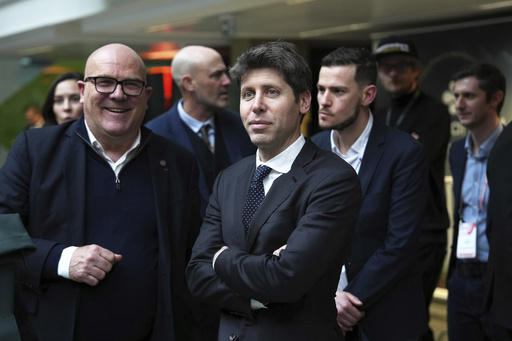
PARIS — Sam Altman, the CEO of OpenAI, has firmly rejected a recent takeover proposal valued at $97.4 billion initiated by rival Elon Musk. This unsolicited bid, revealed on Monday, could potentially complicate Altman’s efforts to steer the company towards a for-profit model. “We are not for sale,” Altman asserted during an artificial intelligence summit in Paris.
Musk’s takeover attempt marks a significant chapter in an ongoing conflict between him and Altman over the leadership of the AI organization they co-founded nearly ten years ago as a nonprofit. Today, OpenAI stands at the forefront of the increasing global interest in generative AI technology. “OpenAI has a mission,” Altman shared in an on-stage discussion with France’s AI minister, surrounded by industry professionals and investors. “We are an unusual organization and we have this mission of making AGI benefit all humanity. And we are here to do that.”
Since its inception in 2015, OpenAI’s primary goal has been to develop artificial general intelligence (AGI) — advanced AI that can outperform human capabilities — while ensuring it is done safely. Musk, who was an early investor and board member, left OpenAI in 2018 following a power struggle that resulted in Altman taking the reins. The tension between Musk and Altman has intensified over the past year, especially as Musk has pursued legal action against OpenAI alongside his ambitions to expand his own AI venture, xAI. This new venture is part of Musk’s extensive portfolio, which includes Tesla and SpaceX.
The implications of Musk’s offer raise questions about OpenAI’s transition from its nonprofit origins to a shareholder-focused entity. The board, which is responsible for the nonprofit, will have to deliberate on Musk’s proposal; it’s not solely up to Altman to decide its fate. Bret Taylor, the chair of the OpenAI board, reiterated during an event that “OpenAI is not for sale,” emphasizing that Musk’s proposal might divert the board from its primary responsibilities relating to its mission.
Taylor further stated that the board’s role is to evaluate strategic choices strictly based on whether they enhance the organization’s commitment to ensuring that AGI benefits humanity. He expressed skepticism about how Musk’s bid would align with this mission. The board is not only tasked with assessing the financial worth of OpenAI’s assets but also with considering the ramifications of ceding control over the development of such pivotal technology. Musk’s bid could set a benchmark for the nonprofit regarding any future sales of its subsidiaries.
Experts suggest that before proceeding, the board should evaluate the legitimacy of Musk’s offer, including considerations around payment methods and the independence of a potential new board under Musk’s influence. The nuances of Musk’s previous $44 billion acquisition of Twitter, which also ignited legal disputes, underscore the complexity of taking control of an organization such as OpenAI, rooted in a charitable mission.
“It is the legally binding purpose,” noted Jill Horwitz, a professor at UCLA School of Law, alluding to the obligations OpenAI committed to the public when it was founded. The growing fame of ChatGPT over the past two years has not only propelled OpenAI into the limelight but has also sparked internal disagreements regarding the organization’s evolving direction, resulting in Altman’s brief firing in late 2023 before his reinstatement.
The core mission of OpenAI, as reaffirmed in 2020, is to ensure that artificial general intelligence benefits all people, which raises critical questions about the company’s ability to fulfill that role should it undergo a major asset sale that undermines its control over technical development.
Musk’s legal contention from a year ago challenges OpenAI’s commitment to its nonprofit origins, asserting that it has strayed from its foundational goals of serving the public interested in AI research. With a court hearing currently underway regarding Musk’s injunction request to halt OpenAI’s for-profit transition, initial indications from a judge suggest skepticism about Musk’s claims of imminent harm due to this shift. Yet, the judge acknowledged that Musk presents valid concerns warranting further examination through a trial.
In addition to Musk and xAI, various investment firms, including Baron Capital Group and Valor Management, have rallied behind the takeover bid. Musk’s attorney expressed that if OpenAI transitions entirely to a profit-driven model, it is essential that the entity receives due compensation for the substantial control being taken over an immensely transformative technology.
Despite the ongoing turmoil, Altman assured staff this week that OpenAI’s existing structure prevents any single individual from gaining control over the organization. He framed Musk’s maneuvers as those of a competitor attempting to bridge the gap with OpenAI. “I think he’s probably just trying to slow us down. He obviously is a competitor,” Altman remarked, during his participation in the Paris summit, emphasizing the intensely personal nature of their rivalry.
In a candid moment, Altman reflected on Musk’s mindset, suggesting, “Probably his whole life is from a position of insecurity. I feel for the guy.”

